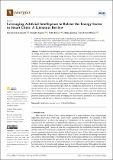Leveraging Artificial Intelligence to Bolster the Energy Sector in Smart Cities: A Literature Review
Author(s)
Camacho, José de Jesús; Aguirre, Bernabé; Ponce, Pedro; Anthony, Brian; Molina, Arturo
Downloadenergies-17-00353.pdf (1.863Mb)
Publisher with Creative Commons License
Publisher with Creative Commons License
Creative Commons Attribution
Terms of use
Metadata
Show full item recordAbstract
As Smart Cities development grows, deploying advanced technologies, such as the Internet of Things (IoT), Cyber–Physical Systems, and particularly, Artificial Intelligence (AI), becomes imperative for efficiently managing energy resources. These technologies serve to coalesce elements of the energy life cycle. By integrating smart infrastructures, including renewable energy, electric vehicles, and smart grids, AI emerges as a keystone, improving various urban processes. Using the PRISMA (Preferred Reporting Items for Systematic Reviews and Meta-Analyses) and the Scopus database, this study meticulously reviews the existing literature, focusing on AI technologies in four principal energy domains: generation, transmission, distribution, and consumption. Additionally, this paper shows the technological gaps when AI is implemented in Smart Cities. A total of 122 peer-reviewed articles are analyzed, and the findings indicate that AI technologies have led to remarkable advancements in each domain. For example, AI algorithms have been employed in energy generation to optimize resource allocation and predictive maintenance, especially in renewable energy. The role of AI in anomaly detection and grid stabilization is significant in transmission and distribution. Therefore, the review outlines trends, high-impact articles, and emerging keyword clusters, offering a comprehensive analytical lens through which the multifaceted applications of AI in Smart City energy sectors can be evaluated. The objective is to provide an extensive analytical framework that outlines the AI techniques currently deployed and elucidates their connected implications for sustainable development in urban energy. This synthesis is aimed at policymakers, urban planners, and researchers interested in leveraging the transformative potential of AI to advance the sustainability and efficiency of Smart City initiatives in the energy sector.
Date issued
2024-01-10Department
Massachusetts Institute of Technology. Department of Mechanical EngineeringPublisher
Multidisciplinary Digital Publishing Institute
Citation
Energies 17 (2): 353 (2024)
Version: Final published version